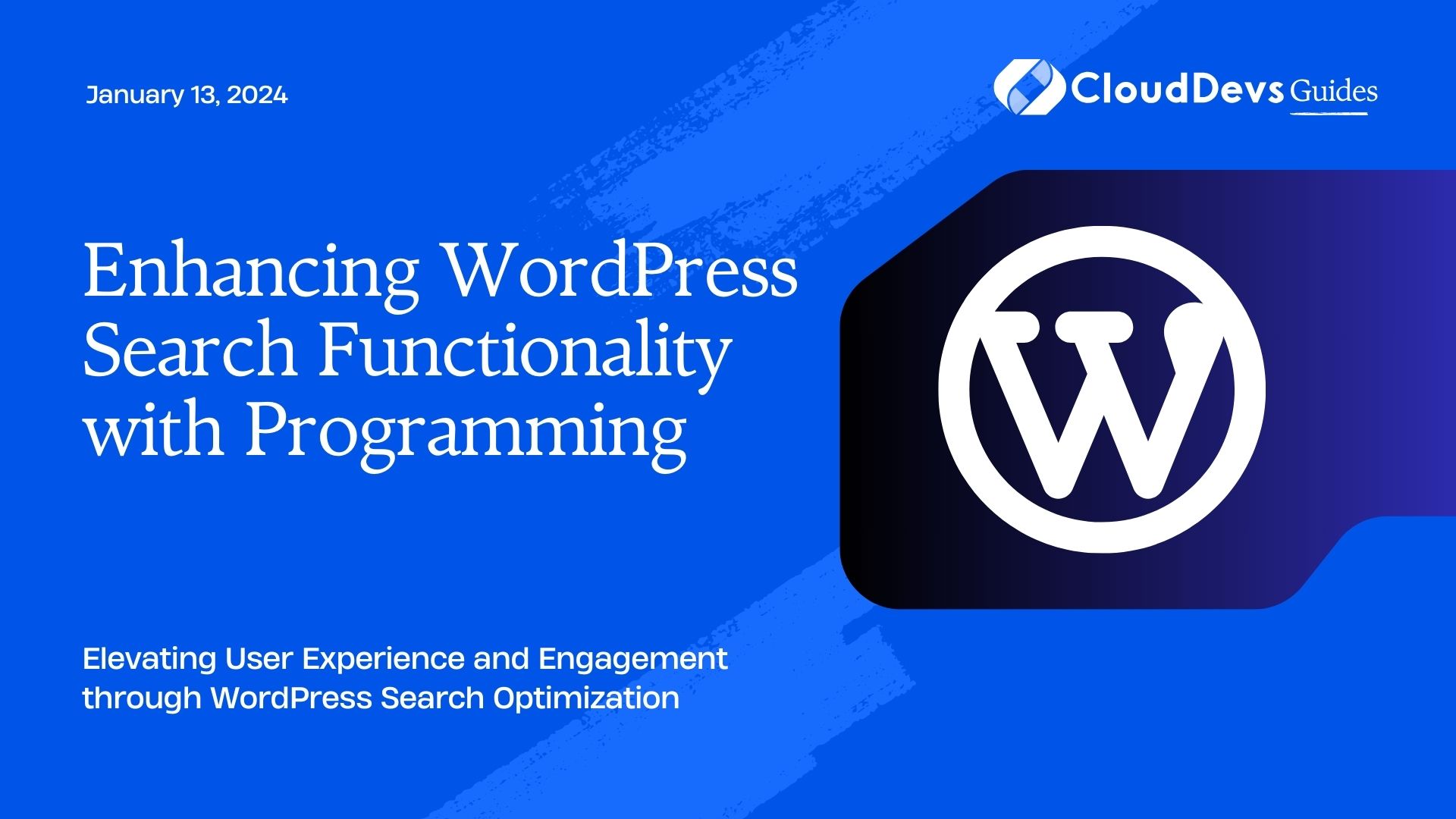Enhancing WordPress Search Functionality with Programming
In the digital age, user experience is paramount, and ensuring that visitors to your WordPress website can quickly find the content they’re looking for is a crucial aspect of providing a positive user journey. The default search functionality that comes with WordPress is functional, but often falls short when it comes to delivering accurate and relevant results. This is where the power of programming comes into play. In this guide, we will explore how you can enhance the search functionality of your WordPress website using programming techniques, resulting in a more efficient, user-friendly, and engaging experience for your audience.
Table of Contents
1. Why is Search Functionality Important?
Before we delve into the technical details, let’s understand the significance of a robust search functionality. Visitors to your website might come with a specific purpose – whether it’s to read an article, make a purchase, or gather information. If they’re unable to locate what they need quickly, frustration sets in, and they might abandon your site in favor of a more user-friendly alternative. An efficient search feature not only keeps users engaged but also encourages them to spend more time exploring your content, which can lead to increased conversions and improved metrics.
2. Shortcomings of Default WordPress Search
Out of the box, WordPress provides a basic search feature that searches through post titles and content. While this might suffice for smaller websites with limited content, it tends to fall short when dealing with larger websites or those with diverse content types. The default search algorithm often struggles with returning relevant results due to its simplicity. Users may get frustrated by irrelevant or incomplete results, hindering their experience.
3.The Role of Programming in Search Enhancement
To overcome the limitations of the default WordPress search, you can harness the power of programming to implement advanced search functionality. By customizing the search process, you can tailor it to your website’s specific needs, ensuring that users receive accurate and relevant results. Let’s explore some programming techniques that can significantly enhance your WordPress search:
3.1. Custom Post Type Inclusion
Many WordPress websites use custom post types to organize different types of content (e.g., articles, products, events). To enhance search, it’s essential to include these custom post types in the search results. This involves modifying the search query to consider additional post types beyond just regular posts and pages. Here’s an example of how you can modify the search query using the pre_get_posts hook in your theme’s functions.php file:
php
function include_custom_post_types_in_search($query) {
if (is_search() && !is_admin()) {
$query->set('post_type', array('post', 'page', 'custom_post_type'));
}
return $query;
}
add_action('pre_get_posts', 'include_custom_post_types_in_search');
Replace ‘custom_post_type’ with the name of your custom post type.
3.2. Custom Fields and Taxonomies
Often, content in WordPress is enriched with custom fields and taxonomies. Incorporating these elements into the search can drastically improve result relevance. You can modify the search query to consider custom field values and taxonomies like categories and tags. This example illustrates how to achieve this:
php
function include_custom_fields_in_search($query) {
if (is_search() && !is_admin()) {
$search_query = get_search_query();
$query->set('meta_query', array(
'relation' => 'OR',
array(
'key' => 'custom_field_name',
'value' => $search_query,
'compare' => 'LIKE'
)
));
}
return $query;
}
add_action('pre_get_posts', 'include_custom_fields_in_search');
Replace ‘custom_field_name’ with the name of your custom field.
3.3. Implementing Full-Text Search
WordPress’s default search performs a basic keyword search, but implementing full-text search can greatly improve result accuracy. Full-text search considers not only exact keyword matches but also related words and phrases. To implement this, you might need to use external search engines or plugins that support full-text indexing. Elasticsearch and Algolia are popular choices that can integrate seamlessly with WordPress.
Conclusion
Enhancing WordPress search functionality through programming techniques can significantly elevate the user experience on your website. By customizing the search process to include custom post types, fields, taxonomies, and even implementing full-text search, you can ensure that your visitors find the content they’re looking for quickly and efficiently. Providing an enhanced search experience can lead to increased user engagement, longer time spent on your website, and improved conversion rates.
Investing the time and effort to optimize your search functionality is a valuable endeavor that can yield substantial benefits. Whether you’re running a blog, an e-commerce site, or a knowledge base, improving how users discover your content is key to building a loyal and satisfied audience.
In a world where attention spans are limited, making every interaction on your website count is vital. By implementing advanced search techniques, you’re not just enhancing your website’s functionality; you’re delivering a positive and memorable user experience. So, dive into the world of programming-driven WordPress search enhancements, and unlock the potential for greater user satisfaction and engagement.
Table of Contents








